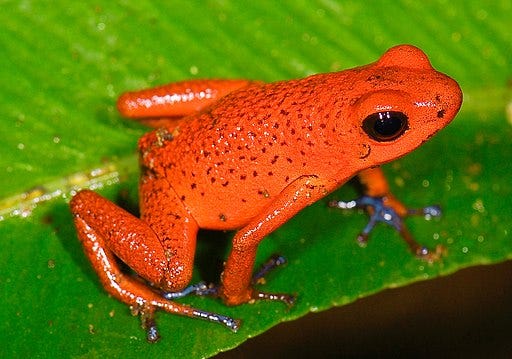Could the legal trade in animals have caused a frog pandemic?
New research has shone a spotlight on the impact on biodiversity of the sale of wild animals
The legal trade in wildlife is having an impact on biodiversity, a new study found, although data deficiencies make the true scale hard to quantify.
At least 70,000 species are in trade globally, according to researchers at the University of Melbourne, and the legal trade in wildlife is ten times larger than illegal trafficking.
The researchers said their findings revealed the sheer number of species taken from their native environments for trade, but also numerous issues of data misinformation or laundering. Such data is hard to find and riddled with discrepancies, making the true scale very difficult to quantify.
The researchers pointed out that the trade comes with significant risks, including the spread of pathogens. The legal trade in some species of frog likely contributed to the spread of a deadly fungal disease which wiped out dozens of amphibian species.
Editor’s note: A little bit of news in that I’m taking a little bit of a break from the newsletter for a few weeks due to some unforeseen circumstances. I hope to be back soon. Paid subscriptions will be put on hold until I return.
Australia: A woman who tried to smuggle 94 reptiles in boots and socks has been jailed for two years and seven months. The Chinese national had packed the animals into the items in order to send them by post to Hong Kong. They included 19 blue-tongued lizards and rock skinks, all native to Australia. (Straits Times)
Thailand: Rangers arrested two men they caught travelling in a car with 81 macaques as cargo. The men are believed to be part of an international wildlife smuggling syndicate and were stopped close to Thailand’s border with Cambodia. (Kuwait Times)
Singapore: Nearly 40kg of smuggled rhino horns were seized at Singapore’s main airport in what is being called the largest seizure of its kind in the country. The horns were enroute from South Africa to Laos and worth more than $1million. Another 150kg of animal parts were discovered in other shipments. (Straits Times)
India: Police made four arrests following an investigation into the alleged sale of Indian star tortoises on Instagram. An account posing as a page for dog lovers was allegedly involved in the illegal sale of 50 animals, investigators said, with 10 rescued during a raid. The animals were delivered to customers using an online delivery app. (Indian Express)
UK: A pile of waste up to 150m long and 6m high has been illegally dumped in a field in Oxfordshire. Local lawmakers described the issue as an “environmental disaster” and “pollution on a grotesque scale”. The dumping is the result of criminal gang activity, officials said warning that action is needed before the local river is polluted. (BBC)
Argentina: A pet shop in Buenos Aires was raided leading to the discovery of 67 animals kept in cramped conditions and showing signs of malnutrition. There were a variety of exotic birds and animals on display for the public to purchase. They included canaries, Java sparrows and zebra finches. (Noticias Ambientales)
UK: Six men were arrested on suspicion of illegal fox hunting in northern England’s Lake District. Fox hunting, which involves the pursuit and killing of foxes by dogs, is a tradition in some parts of British culture but was banned in 2005. Police investigated an alleged incident at a meet of Coniston Foxhounds on November 8, and arrested the men on suspicion of causing unnecessary suffering to a protected animal. (BBC)
Cameroon: Authorities in Cameroon withdrew the flag from a vessel which has been accused of involvement in illegal fishing. The Freedom 7 was built in Japan in 1973 but has changed its name 15 times and is owned by a Hong Kong-based company. It has previously sailed under the flag of Panama, Cambodia, Togo and Tanzania. (Business in Cameroon)
Australia: The Prime Minister has dismissed claims that a Commonwealth scheme of buying fishing boats is subsidising illegal fishermen. The story emerged after a Border Force vessel was photographed with four modified fishing boats on board. Some sources have claimed that the boats were given to illegal fishers and asylum seekers as a safe way to return home. (ABC News)
USA: Researchers at Florida International University have developed a rapid DNA test which will be able to identify shark species immediately from their fins. Shark fins are hugely common in the illegal wildlife trade, but are often shipped separated from their bodies making identifying whether the species is protected extremely difficult. The new tool will be able to provide answers on the spot, making life easier for law enforcement officials. (FIU)
Thank you so much for reading Wild Crime. This is a fully reader-supported publication with no outside funding. Paid subscriptions make it possible for us to dig deeper and pursue investigations that take time and resources. But even if you’re reading for free, you’re helping to keep this work alive, and I’m grateful for that.
If you’d like to support Wild Crime further, consider becoming a paid subscriber or sharing this newsletter with someone who might find it interesting. Every bit of support makes a real difference.


